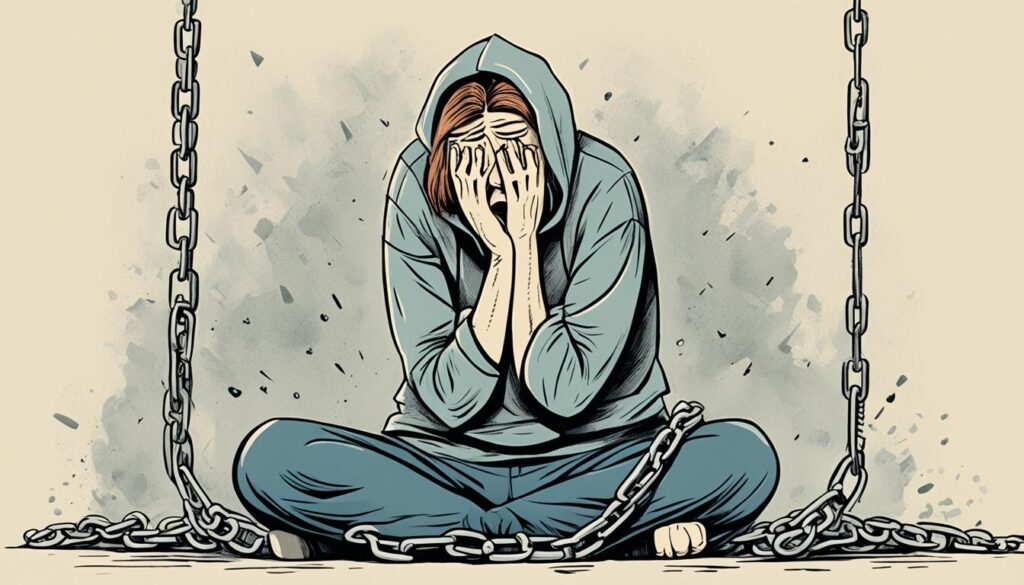How to Stop Feeling Like a Victim and Start Feeling Powerful
Imagine living without feeling like a victim. Imagine having the strength to face any challenge. It’s possible to take back your power and escape feeling trapped.
This article will show you how to stop feeling like a victim. You’ll learn strategies to build strength, resilience, and empowerment. Ready to control your life and change your story? Let’s start this transformative journey together.
Embrace Personal Accountability to Reclaim Control
To beat feeling like a victim, it’s key to grasp the idea of personal accountability. Recognize not just outside causes but also how you shape your own life.

You escape the victim trap by owning up to your actions and emotions. You regain power. Realizing you can steer life despite hurdles is empowering.
Adopting personal accountability means changing how you think. It’s about making choices that reflect your values and goals. And it involves owning your decisions, even when they’re tough.
It’s also about seeing how your actions affect others and facing the outcomes. You have to be open and aim to fix things when needed.
With personal accountability, you take your life back. You stop letting outside situations or others shape your happiness and success. You make thoughtful choices that resonate with your values, pushing you toward your aims.
So, start today. Take your life into your own hands. Use personal accountability as a strong way to regain control and build the life you want.
Understanding the Victim Mentality
We will delve deeper into the victim mentality and explore its main features. Understanding this can help you see these patterns in yourself. It also helps you take steps to break free from it.
The victim mentality often includes blame-shifting, feeling sorry for oneself, and feeling powerless. Those with a victim mentality find it hard to take responsibility for their actions. They blame their circumstances on things they can’t control.
Blame shifting is when people place the blame for their choices on others. This lets them avoid accountability and feel powerless.
Self-pity is focusing on one’s misfortunes and making one’s suffering seem worse. This habit strengthens the victim’s mindset and stops personal growth.
Feeling powerless is a big part of feeling like a victim. People with this mindset think they have no control over their lives. They believe outside forces shape their futures. This belief can hold them back from making positive changes.
To break free from the victim mentality, it’s key to be aware of its traits. Realizing you can change your situation is the first step to personal empowerment.

By fighting the victim mindset, you can build resilience and independence. This change in viewpoint lets you look for solutions, not problems. It helps you take charge of your life.
Next, we’ll look at how to spot triggers of victimhood. This will help you understand how the victim mentality affects your life. Then, you can work on overcoming it.
Identifying Triggers and Patterns of Victimhood
To escape a victim mindset, recognize what sparks feelings of no control. These triggers are common in events that make us feel powerless. Being aware helps us see the thoughts that keep us feeling stuck. Then, we can change these thoughts and become more empowered.

A big trigger is blaming things outside ourselves for our problems. This could be blaming people, situations, or luck for feeling trapped. By seeing this trend, we learn to take charge of our actions and decisions.
Another trigger is wanting others to feel sorry for us. Always looking for sympathy keeps us feeling weak. Instead, we should build our own confidence and rely on ourselves for approval.
Being scared of failure or not being accepted can also trap us. This fear might stop us from trying new things or reaching our dreams. If we see failing as a chance to learn, we can move past feeling like a victim.
Understanding these triggers and behaviors helps us see what keeps us in a victim mindset. Knowing this, we can leave it behind and take back our power.
Strategic Self-Care for Cultivating Resilience
Overcoming hard times and building inner strength heavily relies on self-care. Taking care of yourself isn’t selfish. It’s vital for growing resilience and improving your overall health. By prioritizing self-care, you’re better prepared to face challenges and push through tough times.
Mindfulness plays a crucial role in self-care. It lets you live in the moment and accept your thoughts and feelings without criticism. This awareness increases resilience, helping you tackle problems with calm and clarity.
Physical activity is also key to self-care and resilience. It not only boosts your physical health but your mental state too. Exercise releases endorphins, improving your mood, easing stress, and enhancing your ability to recover from setbacks.
Setting boundaries is another critical self-care strategy. It helps maintain your emotional, physical, and mental health. You prevent burnout and stress by learning to say no and prioritizing yourself.

Incorporating self-care into your everyday life significantly helps you become resilient and strong internally. Caring for your body, mind, and emotions prepares you to bounce back from hardships. It lets you tackle obstacles with confidence and resolve.
How to Stop Feeling Like a Victim Through Mindset Transformation
Changing your mindset is key to moving away from feeling like a victim. Working to shift your views can help you feel strong and resilient. This change involves actively altering your perspective and beliefs.
Reframing negative thoughts is a key step. Rather than fixating on what holds you back, turn those thoughts positive. See obstacles as chances to grow and maintain a hopeful attitude.
Practicing gratitude helps too. Focus on the positives in your life to move away from feeling victimized. Daily, think about what you’re thankful for. This could be your friends, your successes, or nature’s beauty.
Being kind to yourself is also vital. Treat yourself with the same care you would give a friend. Recognize your good points and achievements. And forgive yourself for mistakes or things you see as failures. Through self-compassion, you build a supportive and empowering mindset.
It helps to connect with people who have overcome victimhood. Look for mentors, coaches, or support groups. They can share their stories and encourage you.
Changing your mindset takes time and effort. Make small steps every day to empower yourself. With persistence, you can shift how you see things. Eventually, you’ll stop feeling like a victim and start thriving.
Learning from Historically Empowered Figures
We’ll dive into the lives of historical figures who faced tough times but turned their lives around. These role models can offer us hope and the drive to tackle our challenges.
Nelson Mandela is an example. He was a leader in South Africa who fought against unfair laws. He went from being in jail for 27 years to becoming the country’s first black President. His fight for fairness and equality shows us how we can be empowered by history.

Malala Yousafzai is another courageous figure. She is from Pakistan and fought for girls to go to school. Even after being attacked, she didn’t give up. Malala is the youngest person to win the Nobel Prize and shows the power of standing up for what’s right.
Rosa Parks played a huge part in fighting for equal rights in America. She sparked a huge movement by not giving up her bus seat because of her skin color. Her courage teaches us to stand up against unfair treatment.
These stories of courage teach us that we can face and conquer tough situations. The tough times faced by Mandela, Malala, and Parks reassure us that change is possible. They inspire us to keep going and work for a better future.
Setting Boundaries to Prevent Victimization
It’s key to set clear, healthy boundaries to stop being taken advantage of. This lets you stay safe and feel empowered. Learning to say no is a big part of this, helping put your well-being first.
Setting boundaries means making clear what’s okay and not okay with you. It’s all about being open and firm about your needs and limits. This shows that you respect yourself and your limits.
Boundaries stop you from getting too stressed or used by others. They help keep a good balance in your life. Focusing on your own needs builds self-worth and power.
Remember, your well-being should always come first. Sometimes, saying no is necessary to stay true to yourself. This is important for your mind, feelings, and body.

Also, it’s important to act if someone crosses your boundaries. This might mean stepping back from people or things that hurt you. By doing this, you show that your limits are serious.
Setting your boundaries is a process that never really stops. It might feel hard at first. But, with time, keeping boundaries that look after you and stop harm becomes easier.
Steps to Stop Feeling Like a Victim
To break free from feeling like a victim, it’s key to take steps towards empowerment. Acting on practical strategies helps you start on a path of strength, resilience, and self-empowerment.
Let’s look at some steps you can take:
- Seek support: It’s helpful to have a positive support system. Talk to friends, family, or a therapist for guidance and encouragement on your empowerment journey.
- Reframe negative thoughts: Work on changing negative self-talk to positive. Treat yourself kindly, focus on your strengths, and celebrate your wins.
- Practice self-compassion: Be gentle with yourself. Remember, everyone makes mistakes, and you deserve love and forgiveness.
- Set goals: Create realistic goals for yourself. Having clear goals keeps you motivated and helps shed the victim mindset.
- Cultivate gratitude: Focus on the good in your life. Take time each day to notice and appreciate small joys. This shifts your mindset to one of empowerment.
- Challenge yourself: Try new things and face fears. Small steps towards challenges boost your resilience and confidence.
Following these steps and putting these strategies into action can change your mindset. It will help you stop feeling stuck and start living with more strength, resilience, and personal power.
Empowerment Techniques from Psychological Experts
Experts in psychology offer strategies to help folks regain their power and face challenges. They recommend methods that boost your confidence and strength. This way, you move from feeling powerless to taking charge of your life.
One method that experts love is cognitive-behavioral therapy (CBT). CBT helps you identify and change negative thoughts and actions. It encourages you to see things more positively. With a therapist’s guidance, you learn to cope better and think in empowering ways.
Experts also suggest positive psychology. This focuses on using your strengths and thinking positively. Activities that foster gratitude and kindness towards yourself make you more optimistic. They help you become stronger when dealing with life’s ups and downs.
Mindfulness is another key technique from the experts. It lets you live in the moment, lowers stress, and makes you think clearly. Practices like meditation and deep breathing keep you calm. They boost self-awareness and give you a sense of control.
To find your power, try out these techniques from psychology. It’s never too late to become more resilient and empowered. Getting help from a professional and trying these methods can change your life.
Conclusion
In conclusion, overcoming adversity starts with owning up to your situation. Taking charge of your life allows you to make positive shifts. It’s crucial to grasp what it means to feel like a victim and how to escape that mindset.







